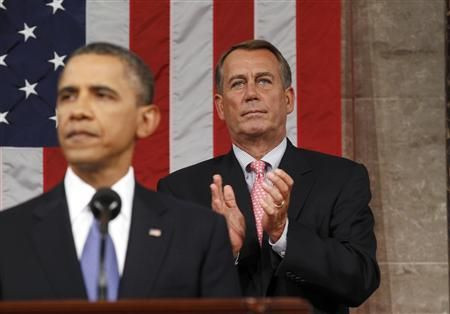Obama, Republicans Shift Tax, Budget Fight Into 2012

President Barack Obama and Republicans in Congress are digging in to fight the 2012 U.S. election campaign over the budget and taxes, leaving a congressional super committee in political no man's land.
On one side is Obama vowing to defend social programs and proposing new taxes on the rich; on the other side are the Republicans opposing any new taxes and demanding deep social program cuts. What's a super committee to do?
Probably the bare minimum required then call it a day, leaving U.S. voters to make the tough decisions about fiscal policy at the polls in November 2012, analysts said.
It leaves the committee in a difficult position, said Keefe Bruyette & Woods policy analyst Brian Gardner.
That is no surprise to skeptics who have long doubted the 12-member, bipartisan super committee's capacity for a fiscal policy breakthrough, yet it will disappoint some.
The bitter debate in Washington had moderated after Congress took its summer break. Lawmakers had gotten an earful from disgusted constituents back home and the mood on Capitol Hill seemed more respectful. Cooperation was in the air.
The super committee, known formally as the Joint Select Committee on Deficit Reduction, by November 23 is supposed to find at least $1.2 trillion in added budget savings over 10 years. Some had been hoping that it would do much more.
A chance of that remains, but political positioning is quickly overtaking the panel's agenda and an ideological standoff that prevailed through most of the year is returning -- a worry for financial markets keen for signs that the United States government is getting its fiscal house in order.
Chances for a super committee deal have faded significantly in the past week, as both sides have dug in their heels, said Greg Valliere, chief political strategist at consultancy Potomac Research Group.
This move by Obama has made a deal even less likely.
ROSE GARDEN TALK
Obama will release a plan on Monday morning at the White House calling for more than $3 trillion in deficit cuts over 10 years, with roughly half of the savings coming from higher taxes on the wealthy and big corporations.
This is purely politics, aimed at Obama's demoralized base. It undoubtedly has been poll-tested, so now Obama has a populist campaign issue. There's obviously no chance this could pass on a vote in Congress, Valliere said.
The president will also vow on Monday to shield middle-class social insurance programs from large-scale cuts as part of a set of recommendations to go to the super committee.
Republican reaction to news of Obama's plan on Sunday night was swift and predictable.
It is disappointing the president has nothing but a fresh slogan for the same job-killing small business tax hikes opposed by bipartisan majorities in Congress, said Michael Steel, spokesman for House Speaker John Boehner, who said himself last week that any tax increases are off the table.
On Obama's proposal for a Buffett tax on millionaires -- named for uber-investor Warren Buffett -- Senate Republican Leader Mitch McConnell said on NBC's Meet the Press: Does anybody think that's a good idea other than the president?
The U.S. budget deficit in 2011 is expected to be about $1.3 trillion. The national debt stands at $14.7 trillion.
Most fiscal experts agree that restructuring of social programs, such as the Medicare and Medicaid healthcare programs for the elderly and poor, is needed to reduce the deficit, along with basic tax reforms that bring in more revenues.
Democrats see unfairness in the present tax system that allows many of the well-to-do and large corporations to dodge taxes. Multibillionaire Buffett, for instance, has said that he pays a lower effective tax rate than many of his employees.
LEVIN: OBAMA ON TARGET
The president's proposed 'Buffett rule' is right on target, said Representative Sander Levin, the top Democrat on the tax-writing House Ways and Means Committee.
Two years ago, only 287,000 out of about 172 million U.S. taxpayers made 9.5 percent of all reported U.S. income, or nearly $727 billion. Of those highest earners, Internal Revenue Service data also showed that 1,470 owed no federal income taxes in 2009.
Today's top tax rate, 35 percent, is half what it was 30 years ago. The last time the tax code was thoroughly overhauled was in 1986, when President Ronald Reagan, a Republican, raised corporate taxes and cut the top tax rate.
The very wealthy in our country have seen their incomes skyrocket while middle class income has stalled and poverty has risen. We need an approach to deficit reduction that is balanced and a tax system that fairly represents today's reality, Levin said in a statement.
© Copyright Thomson Reuters 2024. All rights reserved.





















